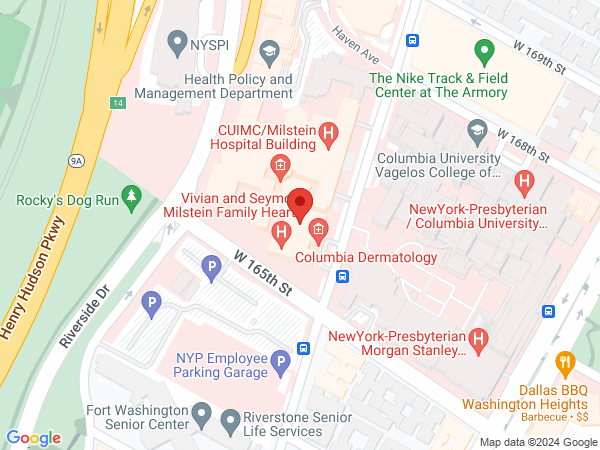Alfred I Neugut, MD
On the web

Overview
Myron M. Studner Professor of Cancer Research and Professor of Medicine and Epidemiology at Columbia University, Associate Director for Population Science, Leader of the Prevention, Control, and Disparities Program for the Herbert Irving Comprehensive Cancer Center at Columbia, and Co-Director of the Cancer Prevention Center of New York Presbyterian Hospital
Dr. Neugut is a medical oncologist with a particular interest in gastroIntestinal tract cancers, especially of colorectal and gasteric cancers. Under the auspices of Columbia's MD/PhD program, he received his MD and a PhD in Pathobiology in 1977. He did his training in Internal Medicine at the Albert Einstein College of Medicine and fellowship in Medical Oncology at Memorial Sloan-Kettering Cancer Center. He returned to Columbia University as an Andrew Mellon Fellow in Epidemiology and Medicine to obtain an MPH in Epidemiology in 1983. Dr. Neugut then joined the faculty at Columbia University with appointments in Medicine and Epidemiology.
As both a practicing medical oncologist and cancer epidemiologist, Dr. Alfred Neugut's major interests have been on GI tract cancers, notably the epidemiology of colorectal adenomas and cancer, as well as colonoscopic screening. He serves as co-principal investigator of the Long Island Breast Cancer Study Project, a large multi-center effort to explore environmental causes of breast cancer on Long Island. Most recently, his efforts have focused on more clinical topics, such as the epidemiology of second malignancies and the use of chemotherapy and radiation therapy among elderly cancer patients. Dr. Neugut focuses a great deal on racial disparities in incidence and survival from cancer and, in particular, variations across subgroups of people of African descent. He leads two large training grants in cancer-related population sciences that together fund 15 pre and postdoctoral trainees in cancer epidemiology, biostatistics, and environmental health sciences, and serves as a mentor to a number of junior faculty.
Areas of Expertise / Conditions Treated
- Colorectal Cancer
- Gastrointestinal Cancer
- Stomach Cancer
Academic Appointments
- Professor of Epidemiology at CUMC
- Myron M. Studner Professor of Cancer Research (in Medicine)
Administrative Titles
- Associate Director for Population Sciences, Herbert Irving Comprehensive Cancer Center
- Co-Director, Cancer Prevention Program
Hospital Affiliations
- NewYork-Presbyterian / Columbia University Irving Medical Center
Gender
- Male
Schedule an Appointment
Virtual Visits/Telehealth
Virtual Visits allow you to connect with your provider from the comfort, convenience, and safety of your own home.
Phone Appointments
Connect Patient Portal
For existing patients, login to make an appointment, view documentation or contact your care provider.
Location(s)
Insurance Accepted
Aetna
- Aetna Signature Administrators
- EPO
- HMO
- Medicare Managed Care
- NY Signature
- POS
- PPO
- Student Health
Affinity Health Plan
- Essential Plan
- Medicaid Managed Care
Amida Care
- Special Needs
Cigna
- EPO
- Great West (National)
- HMO
- POS
- PPO
Emblem/GHI
- Medicare Managed Care
- PPO
Emblem/HIP
- ConnectiCare
- EPO
- Essential Plan
- HMO
- Medicaid Managed Care
- Medicare Managed Care
- POS
- PPO
- Select Care (Exchange)
- Vytra
Empire Blue Cross/Blue Shield
- EPO
- HMO
- Medicare Managed Care
- PPO
Empire Blue Cross Blue Shield HealthPlus
- Child/Family Health Plus
- Essential Plan
- Medicaid Managed Care
Fidelis Care
- Child/Family Health Plus
- Essential Plan
- Medicaid Managed Care
- Medicare Managed Care
Healthfirst
- Child/Family Health Plus
- Leaf (Exchange)
- Medicaid Managed Care
- Medicare Managed Care
Healthspring (Cigna Medicare)
- Medicare Managed Care
Local 1199
- Local 1199
MagnaCare (National)
- MagnaCare
Medicare
- Railroad
- Traditional Medicare
Multiplan
- Multiplan
MVP Health Care
- Child/Family Health Plus
- Essential Plan
- HMO
- Medicaid Managed Care
RiverSpring
- Special Needs
UnitedHealthcare
- Columbia University Employee Plan
- Compass (Exchange)
- Empire Plan
- HMO
- Medicaid (Community Plan)
- Medicare Managed Care
- Oxford Freedom
- Oxford HMO
- Oxford Liberty
- POS
- PPO
VNSNY CHOICE
- Medicare Managed Care
- SelectHealth
- Special Needs
WellCare
- Medicaid Managed Care
- Medicare Managed Care
World Trade Center Health Plan
- World Trade Center Health Plan
Credentials & Experience
Education & Training
- Columbia University College of Physicians and Surgeons
- MPH, 1983 Columbia School of Public Health
- Residency: Bronx Municipal Hospital Center
- Fellowship: Memorial Sloan-Kettering Cancer Center, NY
- Fellowship: Columbia Presbyterian Medical Center, NY
Committees, Societies, Councils
President, American Society of Preventive Oncology, 1999-2001
Editorial Boards
Editorial Board, Cancer Investigation
Board Certifications
- Internal Medicine
- Medical Oncology
Research
Dr. Neugut's research has centered on cancer epidemiology and prevention. He initiated a series of important studies focused on risk factors for the occurrence and recurrence of colorectal adenomatous polyps (adenomas). These studies have extended into the use and yield of colonoscopy and fecal occult blood testing for routine screening and diagnosis. An editorial by Dr. Neugut in 1988 was the first to suggest the use of colonoscopy for routine screening of asymptomatic adults, a common practice now.
Dr. Neugut's second major research focus was the occurrence of second malignancies, especially the impact of radiation therapy. For example, he has found elevated risks of lung cancer and esophageal cancer following breast cancer radiotherapy and of bladder cancer following prostate cancer radiotherapy. Other areas of cancer epidemiology to which he has contributed include cancers of the small bowel, gallbladder, and biliary tree. Dr. Neugut serves as co-principal Investigator of the Long Island Breast Cancer Study Project.
At the present time, a significant amount of Dr. Neugut's research is centered on studying the quality of care in the use of chemotherapy and radiotherapy for cancer in the elderly and others. Racial/ethnic variations in quality of cancer care and outcomes are also research interests as are adherence to treatment and long-term sequelae of cancer therapies.
For the past 15 years Dr. Neugut has served as principal investigator of an NCI-funded Training Program in Cancer Epidemiology, Biostatistics, and Environmental Health Sciences. He is the former President of the American Society of Preventive Oncology, probably the leading U.S. organization for research ion cancer epidemiology and prevention. He has served on numerous study sections and review committees, both at NIH and elsewhere.
Research Interests
- Biostatistical Methods
- Cancer
- Cancer epidemiology and prevention, epidemiology of GI tract cancers and second malignancies
- Cancer treatment in the elderly and access to care in underserved populations
- Chronic disease
- Community Health
- Genetics
- Healthcare Policy
- Health disparities for the underserved
- Health Outcomes and Quality of Care
Selected Publications
Neugut, AI, Forde, KA Screening colonoscopy - has the time come? Am J Gastroenterol 83 295-297 1988
Neugut, AI, Garobwski, GC, Lee, WC, Murray, T, Nieves, JW, Forde, KA, Treat, MR, Waye, JD, Fenoglio-Preiser, C Dietary risk factors for the incidence and recurrence of colorectal adenomatous polyps: a case-control study Ann Int Med 118 91-95 1993
Neugut, AI, Jacobson, JS, Suh, S, Mukherjee, R, Arber, N Epidemiology of cancer of the small intestine Cancer Epidemiol Biomarkers Prev 7 243-251 1998
Neugut, AI, Meadows, AT, Robinson, E Multiple Primary Cancers Lippincott Williams & Wilkins Philadelphia 1999
Terry, MB, Gammon, MD, Zhang FF, Tawfik, H, Teitelbaum, SL, Subbaramaiah, K, Dannenberg, AJ, Neugut, AI Association of frequency and duration of aspirin use and hormone receptor status with breast cancer risk JAMA 291 2433-2440 2004
Neugut, AI, Matasar, M, Wang, X, McBride, R, Jacobson, JS, Grann, VR, Hershman, DL Early discontinuation of adjuvant chemotherapy for colon cancer and its impact on survival J Clin Oncol 24 2368-2375 2006
Kaufman, EL, Jacobson, JS, Hershman, DL, Desai, M, Neugut, AI Effect of breast cancer radiotherapy and cigarette smoking on risk of second primary lung cancer J Clin Oncol 26 392-398 2008
Rundle, AG, Lebwohl, B, Vogel, R, Levine, S, Neugut, AI Colonoscopic screening in average risk individuals ages 40 to 49 versus 50 to 59 years Gastroenterology 134 1311-1315 2008
Hershman, DL, Buono, D, McBride, RB, Tsai, WY, Neugut, AI Influence of private practice setting on adjuvant chemotherapy for elderly women with early-stage breast cancer Cancer 115 3848-3857 2009
Neugut, AI Aspirin and colorectal cancer survival JAMA 302 688-689 2009
Urban Health Activities
Cancer Center-Minority Institution Partnership: Dr. Neugut and colleagues have formed a collaboration with investigators from Long Island University in Brooklyn, headed by Dr. Carol Magai, focused on studying cancer rates, lifestyle, and attitudes towards screening and prevention behavior among Afro-Caribbean populations in Brooklyn, including those from Haiti, Jamaica, Trinidad And Tobago, Barbados, etc. and comparing them to each other and to U.S.-born blacks and whites. Further studies are being explored in the Caribbean area as well.
Colon Screening for the Indigent: With funding from the New York State Department of Health, Dr. Neugut and colleagues have a program in place to provide free fecal occult blood testing for indigent adults in Manhattan. This program provides close to 2000 screening tests each year, as well as 100-150 screening colonoscopies for those at elevated risk for colorectal cancer (e.g., those with a family history of colon cancer).
